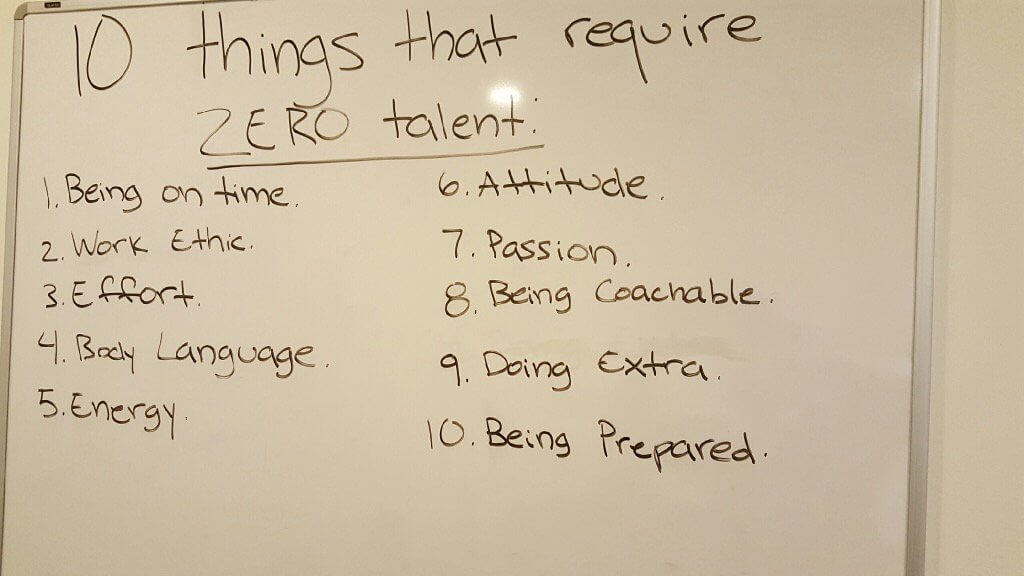 Small moments can have big outcomes if we pay attention, and that’s especially true for leaders of business teams (and sports teams). Sometimes your leadership style develops subtle cracks in its foundation that can lead to structural weakness and collapse.
Small moments can have big outcomes if we pay attention, and that’s especially true for leaders of business teams (and sports teams). Sometimes your leadership style develops subtle cracks in its foundation that can lead to structural weakness and collapse.
Think you’re doing a great job? Wondering if you could improve? This checklist of six signs of ineffective leadership, drawn from our experience with team building, can help you assess and take any necessary action.
1. Your team is “going through the motions.” They’re lackadaisical and “mailing it in.” The passion is lacking. Absences are up, and deadlines are getting missed.
Action item: A positive work culture is built on great relationships, and each team member knows they are supported—and held accountable. When’s the last time you showed them authentic gratitude and reward for a task well done? Make your expectations clear, and your appreciation.
2. Your team doesn’t give you feedback. “The day soldiers stop bringing you their problems is the day you have stopped leading them,” Colin Powell said. “They have either lost confidence that you can help or concluded you do not care.” When communication breaks down, it’s on you to take action.
Action item: Be an exemplar. Consistent individual feedback is important for employee engagement. So is a clear understanding of how to improve their job performance.
3. You talk about your great accomplishments. If you can’t live without admiration and validation for your results, that’s narcissism. This behavior robs your team of self-esteem and foster resentment, because your team sees you as take advantage of them to advance your personal goals.
Action item: It’s not about you. Go back to basics and put your leadership message into three simple words that are outwardly focused. Be aware of your first-person pronouns. I and me are not your friends.
4. You listen less than you talk. This must be a huge problem because when I Googled “why listening is important for leadership,” almost 53 million results came up.
Action item: Work on your listening skills through inspirational videos like this one.
5. Apologizing and remorse is not in your vocabulary. In “Principle Centered Leadership,” Stephen Covey talks about the importance of contrition. “You can’t have a oneness, a unity, without humility.”
Action item: Reflect on the last time someone gave you an authentic apology. Did it build trust without appearing weak? Do you owe one to anyone on your team?
6. You weigh in on everything. Micromanagement doesn’t feel good to anyone. Encourage autonomy and ownership, and you will be an empowering leader, not an ineffective one. Failure is part of growth if you create an environment where your team learns from it.
Action item: When you find yourself micromanaging or constantly “adding value,” ask yourself why? Get clear on why this behavior is occurring. Do you need to make a change with your teammate? Do you need to be clearer? Trust more? What is causing the behavior and what role in it do YOU play?
Your Game Changer Takeaway
Effective leaders don’t hide from the truth. Take an honest inventory of your behavior. If you have identified ineffectiveness, pick one sign to work on for 30 days. Come up with three to five daily rituals that you can follow for behavior change. After a month if you see progress, you can pick a new leadership behavior you want to improve on and again identify daily rituals. Keep going!
The Molly Fletcher Company inspires leaders, teams and organizations to kick-start growth. A keynote speaker and author, Molly draws on her decades of experiences working as a sports agent. Her company’s Game Changer Negotiation Training workshops teach business people the framework for successful negotiating, so that you can close more deals while building stronger relationships. Sign up here to receive our weekly newsletter and subscribe to the Game Changers with Molly Fletcher podcast on iTunes.


















